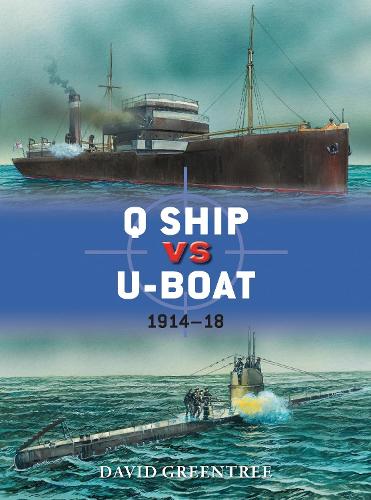
Q Ship vs U-Boat: 191418
(Paperback)
Publishing Details
Q Ship vs U-Boat: 191418
By (Author) David Greentree
Illustrated by Peter Dennis
Illustrated by Ian Palmer
Bloomsbury Publishing PLC
Osprey Publishing
20th February 2014
United Kingdom
Classifications
General
Non Fiction
Military vehicles and transport of air, land and sea
Naval forces and warfare
European history
940.451
Physical Properties
Paperback
80
Width 180mm, Height 246mm, Spine 8mm
300g
Description
Q ships came in all shapes and sizes coastal steamer, trawler, barque, yacht or schooner but all had to look harmless in order to lure their opponents to the surface and encourage them to attack. Armaments differed according to ship size; steamers commonly had 4in guns mounted amidships and in the bow, trawlers 3-pdrs and sailing ships 12-pdrs. Those who served on Q ships had to accept that their U-boat opponents would be able to strike first. Q ship captains kept ready a panic crew, which was trained to act out an elaborate evacuation to convince the U-boat commander that the ship was being abandoned by its crew. The Q ship captain would remain behind with a handful of other crewmen manning the guns, which remained hidden until the most opportune time to unmask and engage the U-boat. The Q ship concept had emerged early in the war when no other method seemed likely to counter the U-boat threat, and flourished until new technologies and tactics were developed, tested and implemented.
Reviews
"This edition by David Greentree covers the development and deployment of q-ships as well as how the tactics changed as the war progressed. It also covers the German side of things and how they reacted to this threat. There are a lot of great period photos and some fine art work and drawings to get an idea of how these ships were designed and used. There are also several superb examples of Q-ship operations and successes. It makes for a most interesting read, a book that no WWI naval fan should be without." --Scott Van Aken, www.modelingmadness.com
Author Bio
David Greentree graduated in History at York before taking a MA in War Studies from King's College London and qualifying as a lecturer in Further Education. In 1995 he accepted a commission in the Royal Air Force and has served in a variety of locations, including Afghanistan and Oman. Ian Palmer is a highly experienced digital artist. A graduate in 3D Design, he currently works as Art Director for a leading UK games developer. Besides his artistic interests he is also a keen musician and motorcyclist.
